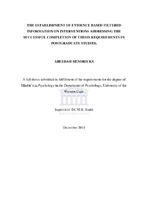| dc.contributor.advisor | Smith, M. R. | |
| dc.contributor.author | Hendricks, Abeedah | |
| dc.date.accessioned | 2015-05-21T20:23:36Z | |
| dc.date.available | 2015-05-21T20:23:36Z | |
| dc.date.issued | 2014 | |
| dc.identifier.uri | http://hdl.handle.net/11394/4183 | |
| dc.description | Magister Artium (Psychology) - MA(Psych) | en_US |
| dc.description.abstract | Postgraduate students are assumed to develop the capacity to conduct research independently and to evaluate their own work as internal supervisors through the process of thesis supervision. Research capacity building amongst postgraduate students is evidenced by the successful completion of degree requirements or graduation, but student retention and throughput is a problem. The study aimed to establish an evidence base of filtered information on interventions addressing the successful completion of thesis requirements in postgraduate students. The study design entailed a systematic review that explored published findings about research reporting on capacity building strategies and initiatives respectively. The researcher made the following ethical considerations namely, transparency, non-bias during data extraction and using two independent reviewers to assist the principle researcher and avoidance of plagiarism as the proposed study is project based and a collaborative process, which are essential when using a systematic review approach. The proposed study forms part of a larger parent study, which aims to identify factors that facilitate or hinder research capacity development in postgraduate students and new academics. The present study used an adaptation of the Preferred Reporting Items for Systematic Reviews and Meta- Analyses (PRISMA) statement, which is aimed at improving the reporting of systematic reviews and meta-analysis. Extracted data were subjected to a meta-synthesis, which included descriptive meta-synthesis and theory-explicative meta-synthesis. Eight articles were identified as good quality articles based on methodological rigour. The good quality research identified 1) high quality supervision, 2) faculty modelling, 3) support and 4) protected research time as effective strategies or interventions that stimulate successful completion of the thesis requirement. The use of appropriate theoretical frameworks in understanding supervision was identified as integral to effective strategies. Limitations of the study were identified and recommendations for future research were provided. | en_US |
| dc.language.iso | en | en_US |
| dc.publisher | University of the Western Cape | en_US |
| dc.subject | Research supervision | en_US |
| dc.subject | Postgraduate students | en_US |
| dc.subject | Research capacity building | en_US |
| dc.title | The establishment of evidence based filtered information on interventions addressing the successful completion of thesis requirements in postgraduate studies | en_US |
| dc.rights.holder | University of the Western Cape | en_US |

